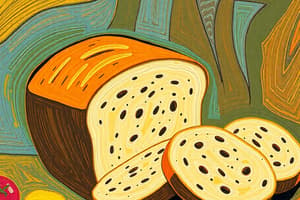Podcast
Questions and Answers
Food staples are the main staples in a population's diet.
Food staples are the main staples in a population's diet.
True (A)
A balanced diet includes getting 45-65% of calories from protein.
A balanced diet includes getting 45-65% of calories from protein.
False (B)
Food choices have no impact on health and well-being.
Food choices have no impact on health and well-being.
False (B)
Legumes like beans and lentils are examples of food staples.
Legumes like beans and lentils are examples of food staples.
Food production does not affect the environment.
Food production does not affect the environment.
Food security is only about having access to any kind of food.
Food security is only about having access to any kind of food.
Cuisine is never a defining characteristic of a region.
Cuisine is never a defining characteristic of a region.
Malnutrition is common in developing countries.
Malnutrition is common in developing countries.
A person's eating habits are never influenced by culture.
A person's eating habits are never influenced by culture.
Access to healthy foods can impact a nation's food security.
Access to healthy foods can impact a nation's food security.
Flashcards
Food Staples?
Food Staples?
Foods regularly consumed by a population, providing a major source of energy and nutrients.
Macronutrients
Macronutrients
The essential components of food that provide energy and contribute to growth and development.
Micronutrients
Micronutrients
Nutrients required in smaller amounts for bodily functions, such as vitamins and minerals.
Balanced Diet
Balanced Diet
Signup and view all the flashcards
Food Production
Food Production
Signup and view all the flashcards
Food Security
Food Security
Signup and view all the flashcards
Cuisine
Cuisine
Signup and view all the flashcards
Food Sustainability
Food Sustainability
Signup and view all the flashcards
Malnutrition
Malnutrition
Signup and view all the flashcards
Food Rituals
Food Rituals
Signup and view all the flashcards
Study Notes
Food is a fundamental necessity of life, providing the energy and nutrients required for the growth, repair, and maintenance of body tissues and the regulation of vital processes. It is a source of macronutrients, such as proteins, carbohydrates, and fats, as well as micronutrients, including vitamins and minerals. The food choices we make have a significant impact on our health and well-being.
Food Staples
Food staples are the main staples in a population's diet. They are regularly consumed and provide a major proportion of a person's energy and nutritional needs. Examples of food staples include grains like rice, wheat, and corn, as well as legumes such as beans and lentils. These foods are often used as the basis for a variety of dishes, providing a stable source of energy and nutrients for individuals and communities.
Nutrition and Health
A balanced diet is essential for maintaining good health. Nutrition guidelines recommend that adults get 10-35% of their calories from protein, 25-35% from fat, and 45-65% from carbohydrates. The Dietary Guidelines for Americans provide guidance on a balanced diet, emphasizing the importance of variety and the consumption of different nutrient-rich foods.
Food Production and Sustainability
Food production has an impact on the environment, including greenhouse gas emissions and land use. Studies have shown that there are trade-offs in the externalities of pig production, with no single system performing well across all measures. However, it's possible to implement mitigation measures within farming systems to avoid these trade-offs and improve the sustainability of food production.
Food and Culture
People's eating habits are influenced by culture, with rituals around food preparation, sharing, and consumption serving social roles as well as biological ones. Cuisine, or the food associated with a specific region, can be a defining characteristic of a region. For example, maize, native to North and Central America, is considered one of Mexico's greatest national treasures.
Food Security
Food security refers to the access a person, family, or community has to healthy foods. Economic security and food security are closely related, as a nation's ability to produce and distribute food can impact its food security. In developing countries, malnutrition is common, and a poor harvest, flood, or drought can lead to famine.
In conclusion, food is a vital component of our lives, providing the energy and nutrients we need to function. The choices we make about what we eat have significant impacts on our health, the environment, and our communities. By understanding the importance of a balanced diet and the role of food in our cultures and societies, we can make more informed decisions about the food we consume and work towards a more sustainable and equitable food system.
Studying That Suits You
Use AI to generate personalized quizzes and flashcards to suit your learning preferences.





